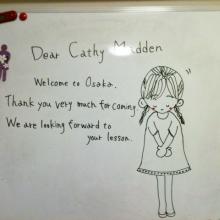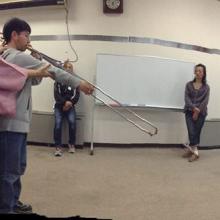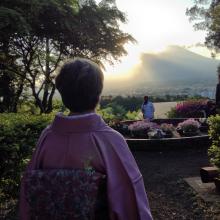Cathy Madden is a Principal Lecturer at the UW School of Drama. Her specialty is the direct integration of the Alexander Technique into the acting process. Cathy leads workshops on the Alexander Technique around the world, including in Japan. Her book Integrative Alexander Technique Practice for Performing Artists: Onstage Synergy is scheduled for publication in January 2015. You can catch Cathy at the third and final installment of the 2014 Performing Arts Lecture Series on Tuesday, November 4. In this blog post, Cathy shares with us how teaching in Japan hones her skills.
Every year, for the last 18 years, I have spent a month or more teaching in Japan. I have taught for different groups, but most of my recent teaching has been with BodyChance, an Alexander Technique Training School for which I am an Associate Director. I teach many people who want to be Alexander Technique teachers, and many who are performing artists.
I don’t experience the teaching in these classes as so different from what I usually do because of the nature of the Alexander Technique – I consider everyone’s process as individual.
People ask me if it is different in some way to teach there. In truth, I mostly experience the teaching as “the same.” I think I don’t experience the teaching in these classes as so different from what I usually do because of the nature of the Alexander Technique – I consider everyone’s process as individual. Each of us has our own micro-culture in our larger culture. My teaching focuses on those personal micro-cultures.
What is different is the environment, the translation process, and the intensity of my schedule.
Illiteracy and Translation
It is quite wonderful to spend time teaching in a place where I am illiterate. The apartment I stay in has about eight pages of drawings and instructions in English to show me how to use all the various appliances. There is one device I have simply decided not to use because if you misuse it, a security guard with a gun appears at your door, and one of my translators/hosts calls on the “rescue cell phone” to say, “Cathy, I’ll be there in a minute.” (Clearly, this did happen once.) Last time I was in Japan, I took a picture of the controls on the combination washer/dryer and brought it to class so my translator could tell me how to use it.
Teaching what I am expert at while simultaneously experiencing a profound “not knowing” in daily life has become an important part of deepening my understanding of education.
The translation pause provides me with more moments than usual to choose words mindfully. The results of this necessary “extra time” shows up not only in how I communicate when I am in Japan, but also gives me new ideas for teaching in English.
Teaching with my expert team of translators hones my language and observation skills. Long ago I learned how to say something, then pause while it is translated, as I continue to observe my students. How they respond as they hear the Japanese gives me clues about whether or not I am communicating clearly. The translation pause also provides me with more moments than usual to choose words mindfully. The results of this necessary “extra time” shows up not only in how I communicate when I am in Japan, but also gives me new ideas for teaching in English. (And I take every opportunity I can to thank my translators! What I do in Japan would be impossible without them.)
Teaching Actors in Japan
This past summer BodyChance organized a special two-day event with young professional actors. It was an intensive workshop integrating the Alexander Technique into a devised piece which included a scenario we developed and monologues the actors prepared in advance. I “wore all my hats:” teaching acting, teaching the Alexander Technique, and working as a director. At each step of devising the piece, we used the Alexander Technique to build full-self investment into every new element. I coached the monologues separately, using both Alexander Technique and acting coaching to bring out each actor’s full potential. At the end of the workshop, we brought the devised scenes and the monologues together to create our performance.
A small group of Alexander Technique teachers observed the workshop and commented on the exponential growth they saw in the actors over the two days.
Immersion Teaching
The actor’s workshop was 6 hours each day for two days. Most of my days of teaching in Japan involve two 3-hour classes and 3-4 hours of additional teaching – private lessons, small workshops, etc. I teach a lot! And out of the immersion, new ideas emerge.
Then I go to the store and stand in front of the area that is various kinds of milk, pondering which one is actually the milk I want to buy. (I brought something home once that definitely was not milk…I wonder what it was.)





